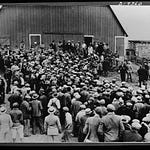
What is American conservatism?
Edmund Burke is the father of philosophical conservatism. His ideas laid the foundation for conservative philosophy, particularly in the United States. He advocated preserving established institutions and societal norms, balanced by a cautious approach to reform and adaptation.
Born January 12, 1729, Burke was an Irish statesman and philosopher. His ideas and writings through the American and French Revolutions significantly influenced the development of conservative thought in both America and Europe.
Burke’s principles:
Respect for Tradition and Established Institutions
Burke believed that traditions and institutions develop organically over generations and embody the collective wisdom of society. He argued that these traditions should be respected and preserved, as they provide stability and continuity.
Respect for tradition underpins many of his other principles, such as skepticism of radical change and the importance of gradual reform. This principle has had a lasting impact on conservative thought, emphasizing the value of continuity, respect for historical context, and the cautious evolution of societal norms and structures.
American conservatism's adherence to originalism in judicial interpretation reflects Burke's respect for historical traditions. The conservative focus on protecting Constitutional rights like the right to bear arms reflects Burke’s principle of safeguarding established freedoms. The preference for states' rights over federal authority aligns with Burke's skepticism of centralized power, which advocates for a balanced, decentralized governance structure.
Prudence and Caution in Change
Burke advocated for cautious, gradual change rather than abrupt or revolutionary transformations.
He believed that society’s established institutions and practices evolved and embedded us with the collective wisdom of past experiences. He did not oppose change outright. Instead, he argued for an incremental approach, allowing society to adapt and manage unintended consequences.
For example, conservatives typically advocate for market-based solutions in healthcare, such as Health Savings Accounts (HSAs) and private health insurance options. This approach reflects a belief in established market mechanisms and a cautious approach to government intervention.
Skepticism of Radicalism and Utopian Ideals
Burke was skeptical of radical political ideologies and utopian schemes, warning against the dangers of overthrowing established systems in pursuit of ideological goals.
In response to what many Americans saw as police brutality and the subsequent “Defund the Police” movement, conservatives saw a radical and utopian ideal that risked destabilizing an essential institution that, on the whole, protects individual Americans and their businesses.
Practical Approach to Politics
Burke was pragmatic. He believed we should base political decisions on practical experience and specific circumstances rather than abstract principles or ideological dogmas.
Burke’s pragmatic views transcended political party thinking. In his 1770 Thoughts on the Cause of the Present Discontents, Burke wrote that a political party was (paraphrased for modern language) a group of people working together to advance the national interest based on their agreed-upon principles.
He advocated for pragmatic approaches. Many conservatives approach environmental policy by focusing on practical solutions that balance economic growth with environmental protection.
Now for some early American context. In the face of the American Revolution, Burke didn’t argue against progress. Burke sought to address the practical and political missteps of the British government and expressed that England should pursue conciliatory measures with the colonies. Burke was not against change.
For example, Burke was against the taxation of the American colonies. His advocacy for the colonies’ right to self-taxation demonstrated his respect for societal autonomy and skepticism of overarching authority. He gave two speeches, the second in March of 1775, advocating for the right of the American colonies to tax themselves and guide their affairs. Burke believed allowing the colonies to govern themselves would encourage them to remain united with England.
King George rejected this notion.
The American Revolution began a month later, on April 19, 1775, at the North Bridge in Concord, Massachusetts. On that day, the first American colonists fired on British troops, referred to as “Redcoats,” because of their red coats.
Along with Burke’s conservatism, another philosophical movement came into play in early America.
Burke’s conservatism drew from European society. European conservatism sought to preserve monarchies, aristocracy, and traditional social hierarchies, viewing them as stabilizing societal forces.
The American foundation had no aristocracy. As a result, the American foundation oriented towards a different philosophy. In a democratic republic where no monarchy or entrenched aristocracy existed, the principles of individual liberty, limited government, and the protection of private property led societal thought.
Enter John Locke’s Enlightenment liberalism, the foundation of American documents. Locke’s philosophy became the strong outline of the US Constitution.
In Two Treatises of Government, Locke’s broad ideas include:
We believe we all have natural rights to life, liberty, and the pursuit of happiness.
Government exists as a social contract wherein representatives serve with the consent of the governed.
To prevent tyranny, we divide government power to include a system of checks and balances among the legislative, executive, and judicial branches.
The structure of our constitutional democratic republic, which flows from our Constitution’s structure, flows from Locke’s theories.
In the American context, Burke’s views contrasted and complemented Locke’s.
In combination, American principles weave threads of both Edmund Burke’s conservatism and John Locke’s liberalism. Burkean conservatives and enlightenment liberals don’t agree on all matters. Burke’s emphasis on preserving traditions and cautious reform countered Locke’s advocacy for radical individualism.
However, there is much common ground. So much common ground that today in America conservatism and individualism are nearly synonymous.
Burkean conservatives protect and promote individual freedoms, particularly those influenced by John Locke’s liberalism. Burkean conservatives advocate for limited government and divided power, a philosophy outlined by Locke. Burkean conservatives argue that individuals should take responsibility for their own lives, successes, and failures, rather than relying on government assistance or intervention. This principle is consistent with Locke’s views of the natural right of individuals to own themselves and the product of their labor.
Burke’s pragmatism and Locke’s revolutionary vision created a rich, complex foundation for American political thought. The two philosophies underscore our unique political evolution, where respect for historical institutions coexists with a commitment to individual liberty and democratic governance.
Stated another way:
American conservatism seeks first to conserve the American ideals of enlightenment liberalism.
American conservativism intends to preserve the principles of the American foundation, particularly the emphasis on individual liberty, limited government, and the protection of private property.
America owes allegiance to no man. There is no monarchy to preserve. There is no king. America is an ideal. Servants of the nation swear their oath to support and defend the Constitution. Therefore, American conservatism must seek to preserve the institution of the Constitution and not even a political party.
Pulling on the thread further, we can conclude that American conservatism must seek to preserve the people’s natural rights to life, liberty, and the pursuit of happiness. Representatives must strive to serve the nation’s interests instead of purely their interests, and must maintain a balance of power to protect the people from both the tyranny of the government and the tyranny of the majority.
What is American conservatism?
American conservatism represents the combined philosophies of Edmund Burke and John Locke. It incorporates respect for tradition, prudential governance, and individual liberty. It is a philosophy that values the wisdom of the past, seeks cautious progress in the present, and seeks a vision for a stable, prosperous future.
As we look ahead, American conservatives face the challenge of adapting these enduring principles to the evolving needs of a diverse and dynamic society.
The future trajectory of American conservatism lies in its ability to balance its foundational ideals with the realities of this changing world. It must navigate the complexities of modern governance while upholding the principles of limited government, individual rights, and respect for established institutions.
May God bless the United States of America.












